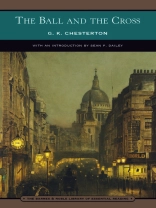When Evan Mac Ian, a fervent Catholic, becomes enraged by an atheist newspaper, he challenges the editor, James Turnbull, to a duel. Turnbull, just as passionate in his atheism as Mac Ian is in his Catholicism, eagerly accepts. Their sword fight interrupted wherever they go, Mac Ian and Turnbull duel with words. The more Mac Ian and Turnbull debate, the more they realize that they have more in common than they thought. They come to understand that their enemy is not each other, but a world that has grown too cold to tolerate men who not only believe in something, but believe in it enough to fight for it. Mac Ian and Turnbull gradually cease debating each other and begin to engage the people who interrupt their duel. Here we see
G. K. Chesterton’s great genius in his fiction: his ability to bring philosophical and theological ideas to life through his characters and stories. In
The Ball and the Cross he accomplishes this with some of the wittiest and most engaging writing to be found in any of his novels.
Über den Autor
G. K. Chesterton (1874-1936) was a larger-than-life writer who fascinates and perplexes us to this day. An art student who became a poet, and then by turns a journalist, playwright, biographer, novelist, storyteller, philosopher, and “Christian apologist, ” his fame rested on an uncanny ability to produce vast quantities of crystalline prose quickly and without apparent effort. His fiction–particularly the Father Brown stories and the delirious suspense novel The Man Who Was Thursday–remains his most widely read and entertaining works.












